Essay on Intellectual Disabilities: Cognitive Abilities and Support
VerifiedAdded on 2021/06/17
|10
|2910
|48
Essay
AI Summary
This essay provides a comprehensive overview of intellectual disabilities, focusing on cognitive abilities and developmental delays. It explores the impact of intellectual disabilities on children and adults, examining cognitive skills such as communication, socialization, learning, and understanding. The essay analyzes developmental delays through Piaget’s theory of cognitive development, highlighting the different stages and associated challenges. Furthermore, it emphasizes the support measures necessary for individuals with intellectual disabilities to adapt to society, including early screening, research and development, medical assistance, and individualized educational programs. The essay concludes by underscoring the importance of assistive models and ongoing care for those experiencing developmental delays, advocating for improved support systems and preventive measures to address this condition.
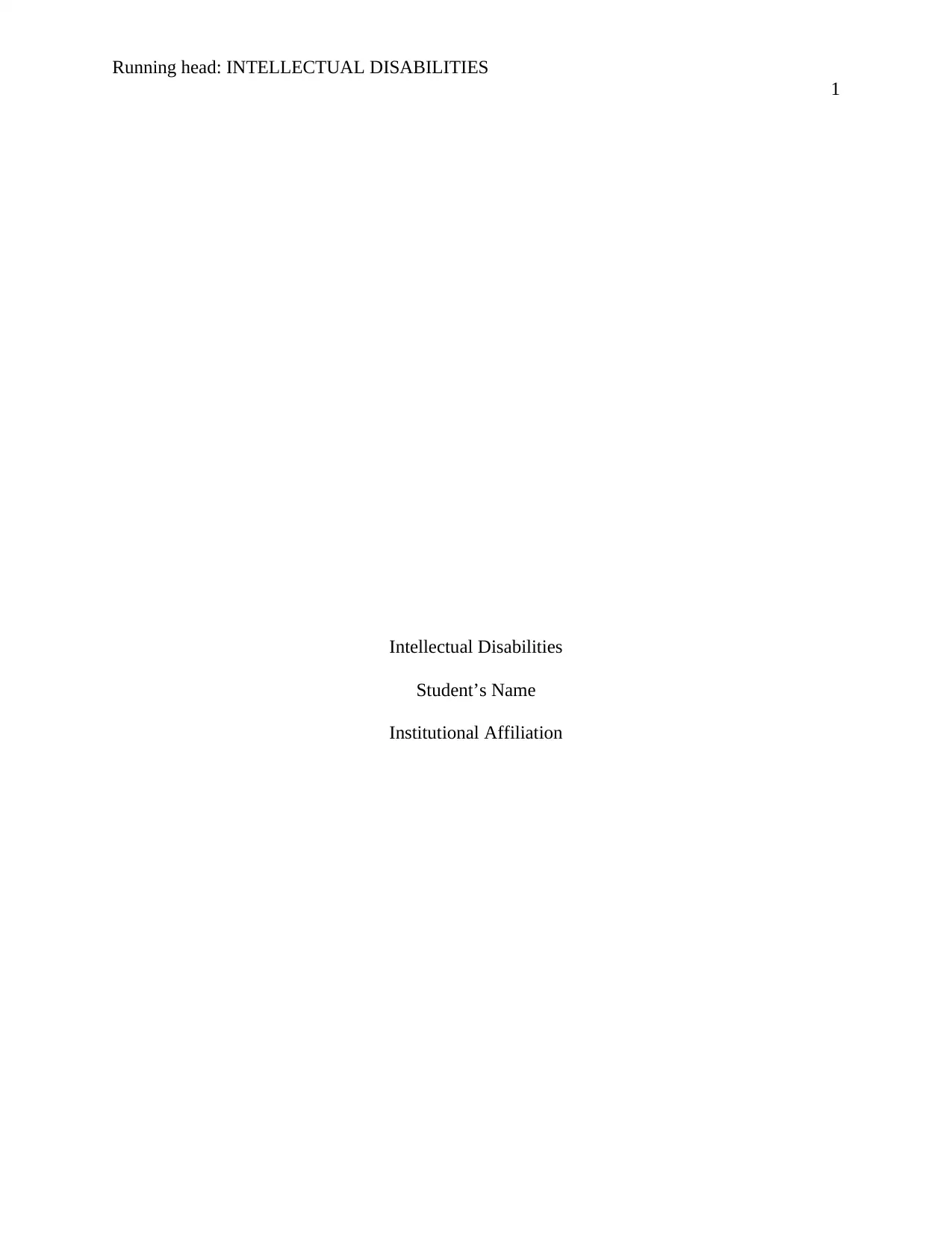
Running head: INTELLECTUAL DISABILITIES
1
Intellectual Disabilities
Student’s Name
Institutional Affiliation
1
Intellectual Disabilities
Student’s Name
Institutional Affiliation
Paraphrase This Document
Need a fresh take? Get an instant paraphrase of this document with our AI Paraphraser
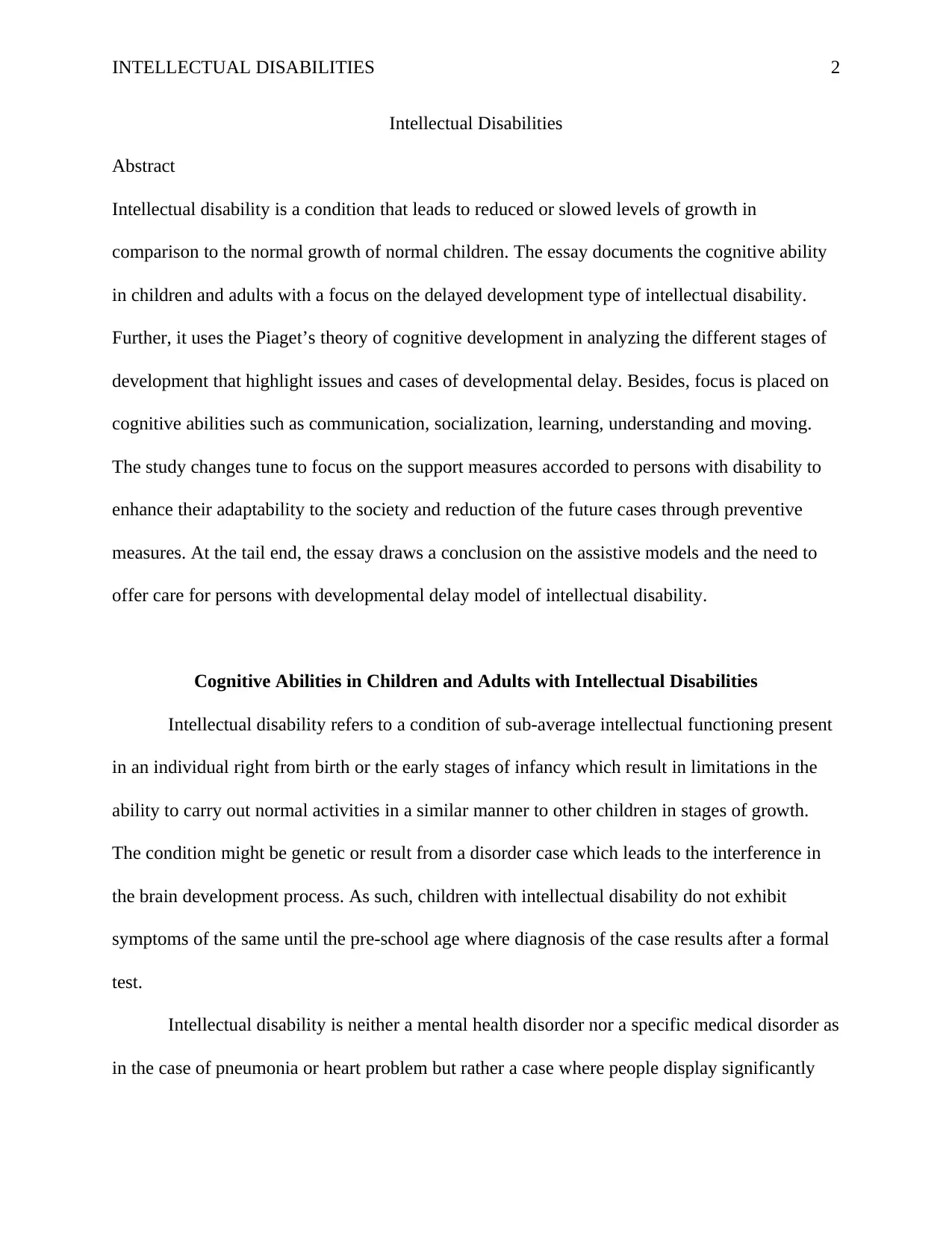
INTELLECTUAL DISABILITIES 2
Intellectual Disabilities
Abstract
Intellectual disability is a condition that leads to reduced or slowed levels of growth in
comparison to the normal growth of normal children. The essay documents the cognitive ability
in children and adults with a focus on the delayed development type of intellectual disability.
Further, it uses the Piaget’s theory of cognitive development in analyzing the different stages of
development that highlight issues and cases of developmental delay. Besides, focus is placed on
cognitive abilities such as communication, socialization, learning, understanding and moving.
The study changes tune to focus on the support measures accorded to persons with disability to
enhance their adaptability to the society and reduction of the future cases through preventive
measures. At the tail end, the essay draws a conclusion on the assistive models and the need to
offer care for persons with developmental delay model of intellectual disability.
Cognitive Abilities in Children and Adults with Intellectual Disabilities
Intellectual disability refers to a condition of sub-average intellectual functioning present
in an individual right from birth or the early stages of infancy which result in limitations in the
ability to carry out normal activities in a similar manner to other children in stages of growth.
The condition might be genetic or result from a disorder case which leads to the interference in
the brain development process. As such, children with intellectual disability do not exhibit
symptoms of the same until the pre-school age where diagnosis of the case results after a formal
test.
Intellectual disability is neither a mental health disorder nor a specific medical disorder as
in the case of pneumonia or heart problem but rather a case where people display significantly
Intellectual Disabilities
Abstract
Intellectual disability is a condition that leads to reduced or slowed levels of growth in
comparison to the normal growth of normal children. The essay documents the cognitive ability
in children and adults with a focus on the delayed development type of intellectual disability.
Further, it uses the Piaget’s theory of cognitive development in analyzing the different stages of
development that highlight issues and cases of developmental delay. Besides, focus is placed on
cognitive abilities such as communication, socialization, learning, understanding and moving.
The study changes tune to focus on the support measures accorded to persons with disability to
enhance their adaptability to the society and reduction of the future cases through preventive
measures. At the tail end, the essay draws a conclusion on the assistive models and the need to
offer care for persons with developmental delay model of intellectual disability.
Cognitive Abilities in Children and Adults with Intellectual Disabilities
Intellectual disability refers to a condition of sub-average intellectual functioning present
in an individual right from birth or the early stages of infancy which result in limitations in the
ability to carry out normal activities in a similar manner to other children in stages of growth.
The condition might be genetic or result from a disorder case which leads to the interference in
the brain development process. As such, children with intellectual disability do not exhibit
symptoms of the same until the pre-school age where diagnosis of the case results after a formal
test.
Intellectual disability is neither a mental health disorder nor a specific medical disorder as
in the case of pneumonia or heart problem but rather a case where people display significantly
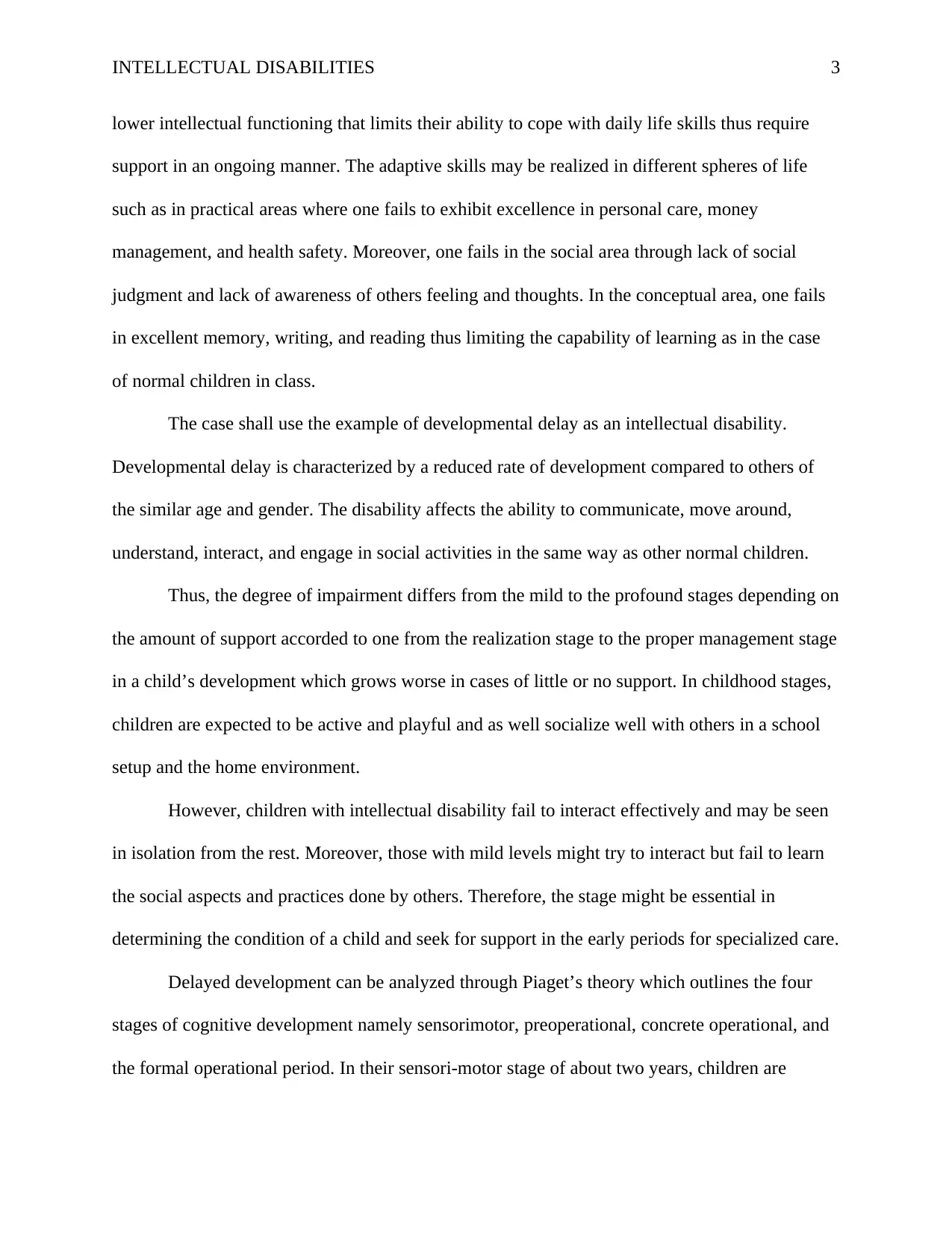
INTELLECTUAL DISABILITIES 3
lower intellectual functioning that limits their ability to cope with daily life skills thus require
support in an ongoing manner. The adaptive skills may be realized in different spheres of life
such as in practical areas where one fails to exhibit excellence in personal care, money
management, and health safety. Moreover, one fails in the social area through lack of social
judgment and lack of awareness of others feeling and thoughts. In the conceptual area, one fails
in excellent memory, writing, and reading thus limiting the capability of learning as in the case
of normal children in class.
The case shall use the example of developmental delay as an intellectual disability.
Developmental delay is characterized by a reduced rate of development compared to others of
the similar age and gender. The disability affects the ability to communicate, move around,
understand, interact, and engage in social activities in the same way as other normal children.
Thus, the degree of impairment differs from the mild to the profound stages depending on
the amount of support accorded to one from the realization stage to the proper management stage
in a child’s development which grows worse in cases of little or no support. In childhood stages,
children are expected to be active and playful and as well socialize well with others in a school
setup and the home environment.
However, children with intellectual disability fail to interact effectively and may be seen
in isolation from the rest. Moreover, those with mild levels might try to interact but fail to learn
the social aspects and practices done by others. Therefore, the stage might be essential in
determining the condition of a child and seek for support in the early periods for specialized care.
Delayed development can be analyzed through Piaget’s theory which outlines the four
stages of cognitive development namely sensorimotor, preoperational, concrete operational, and
the formal operational period. In their sensori-motor stage of about two years, children are
lower intellectual functioning that limits their ability to cope with daily life skills thus require
support in an ongoing manner. The adaptive skills may be realized in different spheres of life
such as in practical areas where one fails to exhibit excellence in personal care, money
management, and health safety. Moreover, one fails in the social area through lack of social
judgment and lack of awareness of others feeling and thoughts. In the conceptual area, one fails
in excellent memory, writing, and reading thus limiting the capability of learning as in the case
of normal children in class.
The case shall use the example of developmental delay as an intellectual disability.
Developmental delay is characterized by a reduced rate of development compared to others of
the similar age and gender. The disability affects the ability to communicate, move around,
understand, interact, and engage in social activities in the same way as other normal children.
Thus, the degree of impairment differs from the mild to the profound stages depending on
the amount of support accorded to one from the realization stage to the proper management stage
in a child’s development which grows worse in cases of little or no support. In childhood stages,
children are expected to be active and playful and as well socialize well with others in a school
setup and the home environment.
However, children with intellectual disability fail to interact effectively and may be seen
in isolation from the rest. Moreover, those with mild levels might try to interact but fail to learn
the social aspects and practices done by others. Therefore, the stage might be essential in
determining the condition of a child and seek for support in the early periods for specialized care.
Delayed development can be analyzed through Piaget’s theory which outlines the four
stages of cognitive development namely sensorimotor, preoperational, concrete operational, and
the formal operational period. In their sensori-motor stage of about two years, children are
⊘ This is a preview!⊘
Do you want full access?
Subscribe today to unlock all pages.

Trusted by 1+ million students worldwide
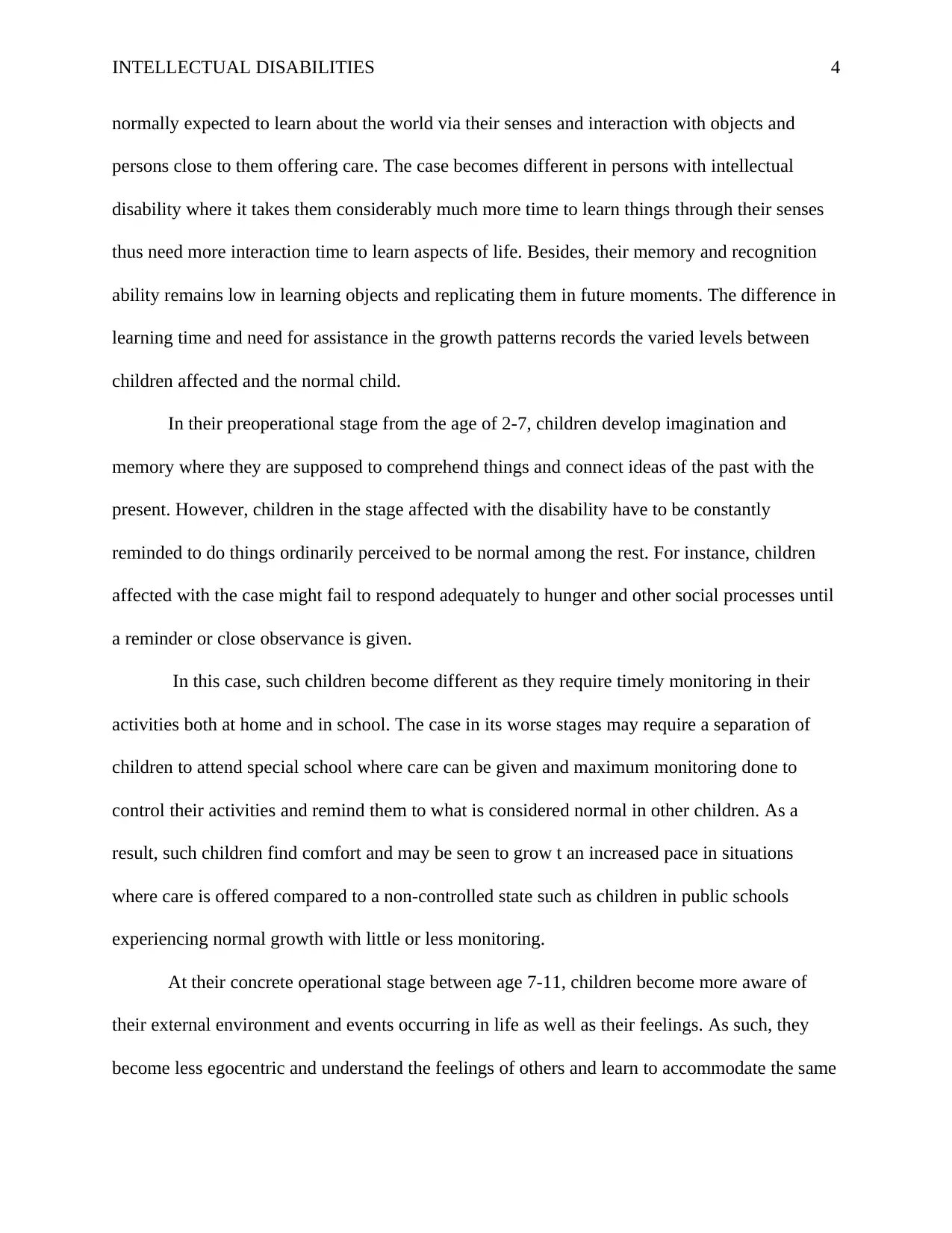
INTELLECTUAL DISABILITIES 4
normally expected to learn about the world via their senses and interaction with objects and
persons close to them offering care. The case becomes different in persons with intellectual
disability where it takes them considerably much more time to learn things through their senses
thus need more interaction time to learn aspects of life. Besides, their memory and recognition
ability remains low in learning objects and replicating them in future moments. The difference in
learning time and need for assistance in the growth patterns records the varied levels between
children affected and the normal child.
In their preoperational stage from the age of 2-7, children develop imagination and
memory where they are supposed to comprehend things and connect ideas of the past with the
present. However, children in the stage affected with the disability have to be constantly
reminded to do things ordinarily perceived to be normal among the rest. For instance, children
affected with the case might fail to respond adequately to hunger and other social processes until
a reminder or close observance is given.
In this case, such children become different as they require timely monitoring in their
activities both at home and in school. The case in its worse stages may require a separation of
children to attend special school where care can be given and maximum monitoring done to
control their activities and remind them to what is considered normal in other children. As a
result, such children find comfort and may be seen to grow t an increased pace in situations
where care is offered compared to a non-controlled state such as children in public schools
experiencing normal growth with little or less monitoring.
At their concrete operational stage between age 7-11, children become more aware of
their external environment and events occurring in life as well as their feelings. As such, they
become less egocentric and understand the feelings of others and learn to accommodate the same
normally expected to learn about the world via their senses and interaction with objects and
persons close to them offering care. The case becomes different in persons with intellectual
disability where it takes them considerably much more time to learn things through their senses
thus need more interaction time to learn aspects of life. Besides, their memory and recognition
ability remains low in learning objects and replicating them in future moments. The difference in
learning time and need for assistance in the growth patterns records the varied levels between
children affected and the normal child.
In their preoperational stage from the age of 2-7, children develop imagination and
memory where they are supposed to comprehend things and connect ideas of the past with the
present. However, children in the stage affected with the disability have to be constantly
reminded to do things ordinarily perceived to be normal among the rest. For instance, children
affected with the case might fail to respond adequately to hunger and other social processes until
a reminder or close observance is given.
In this case, such children become different as they require timely monitoring in their
activities both at home and in school. The case in its worse stages may require a separation of
children to attend special school where care can be given and maximum monitoring done to
control their activities and remind them to what is considered normal in other children. As a
result, such children find comfort and may be seen to grow t an increased pace in situations
where care is offered compared to a non-controlled state such as children in public schools
experiencing normal growth with little or less monitoring.
At their concrete operational stage between age 7-11, children become more aware of
their external environment and events occurring in life as well as their feelings. As such, they
become less egocentric and understand the feelings of others and learn to accommodate the same
Paraphrase This Document
Need a fresh take? Get an instant paraphrase of this document with our AI Paraphraser
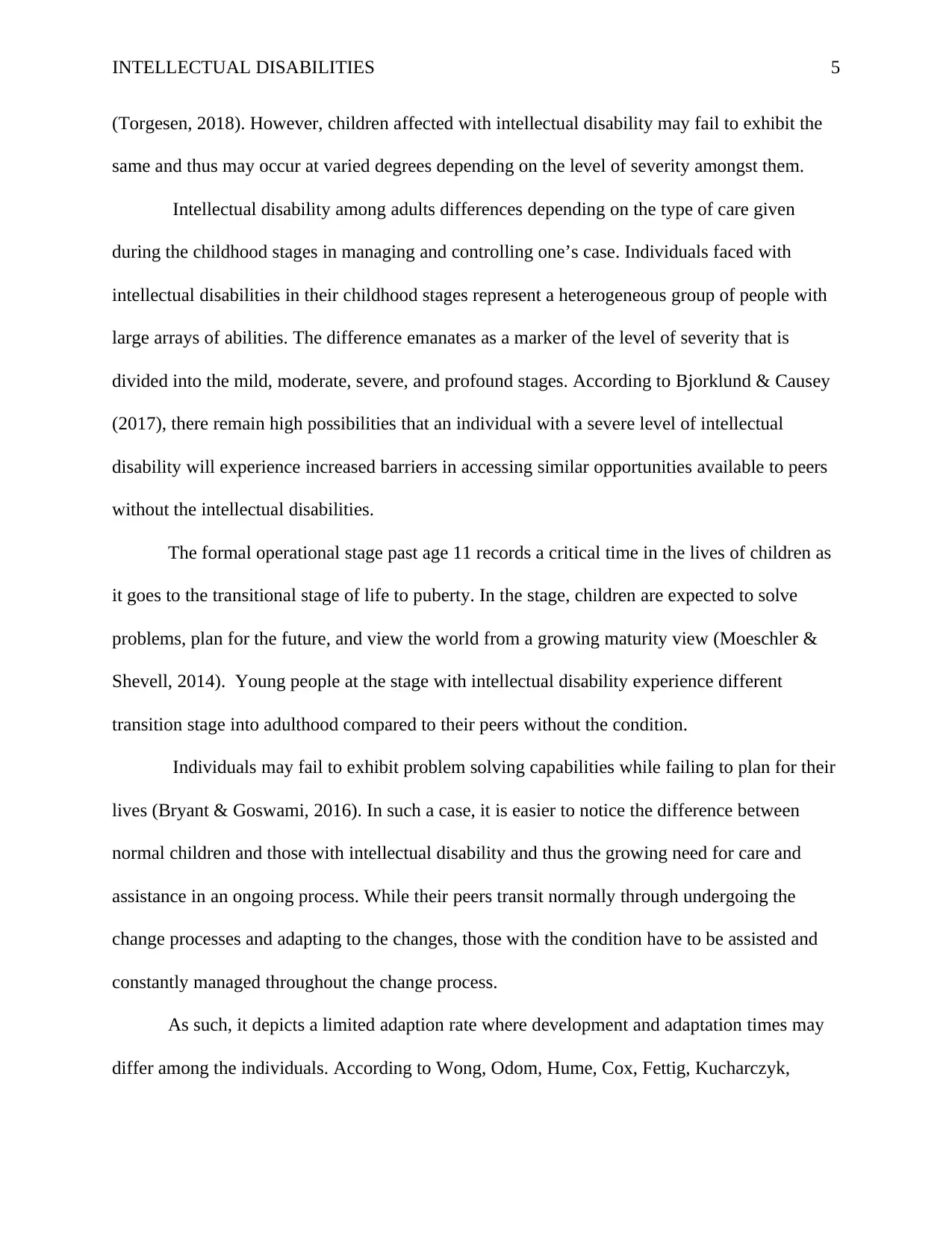
INTELLECTUAL DISABILITIES 5
(Torgesen, 2018). However, children affected with intellectual disability may fail to exhibit the
same and thus may occur at varied degrees depending on the level of severity amongst them.
Intellectual disability among adults differences depending on the type of care given
during the childhood stages in managing and controlling one’s case. Individuals faced with
intellectual disabilities in their childhood stages represent a heterogeneous group of people with
large arrays of abilities. The difference emanates as a marker of the level of severity that is
divided into the mild, moderate, severe, and profound stages. According to Bjorklund & Causey
(2017), there remain high possibilities that an individual with a severe level of intellectual
disability will experience increased barriers in accessing similar opportunities available to peers
without the intellectual disabilities.
The formal operational stage past age 11 records a critical time in the lives of children as
it goes to the transitional stage of life to puberty. In the stage, children are expected to solve
problems, plan for the future, and view the world from a growing maturity view (Moeschler &
Shevell, 2014). Young people at the stage with intellectual disability experience different
transition stage into adulthood compared to their peers without the condition.
Individuals may fail to exhibit problem solving capabilities while failing to plan for their
lives (Bryant & Goswami, 2016). In such a case, it is easier to notice the difference between
normal children and those with intellectual disability and thus the growing need for care and
assistance in an ongoing process. While their peers transit normally through undergoing the
change processes and adapting to the changes, those with the condition have to be assisted and
constantly managed throughout the change process.
As such, it depicts a limited adaption rate where development and adaptation times may
differ among the individuals. According to Wong, Odom, Hume, Cox, Fettig, Kucharczyk,
(Torgesen, 2018). However, children affected with intellectual disability may fail to exhibit the
same and thus may occur at varied degrees depending on the level of severity amongst them.
Intellectual disability among adults differences depending on the type of care given
during the childhood stages in managing and controlling one’s case. Individuals faced with
intellectual disabilities in their childhood stages represent a heterogeneous group of people with
large arrays of abilities. The difference emanates as a marker of the level of severity that is
divided into the mild, moderate, severe, and profound stages. According to Bjorklund & Causey
(2017), there remain high possibilities that an individual with a severe level of intellectual
disability will experience increased barriers in accessing similar opportunities available to peers
without the intellectual disabilities.
The formal operational stage past age 11 records a critical time in the lives of children as
it goes to the transitional stage of life to puberty. In the stage, children are expected to solve
problems, plan for the future, and view the world from a growing maturity view (Moeschler &
Shevell, 2014). Young people at the stage with intellectual disability experience different
transition stage into adulthood compared to their peers without the condition.
Individuals may fail to exhibit problem solving capabilities while failing to plan for their
lives (Bryant & Goswami, 2016). In such a case, it is easier to notice the difference between
normal children and those with intellectual disability and thus the growing need for care and
assistance in an ongoing process. While their peers transit normally through undergoing the
change processes and adapting to the changes, those with the condition have to be assisted and
constantly managed throughout the change process.
As such, it depicts a limited adaption rate where development and adaptation times may
differ among the individuals. According to Wong, Odom, Hume, Cox, Fettig, Kucharczyk,
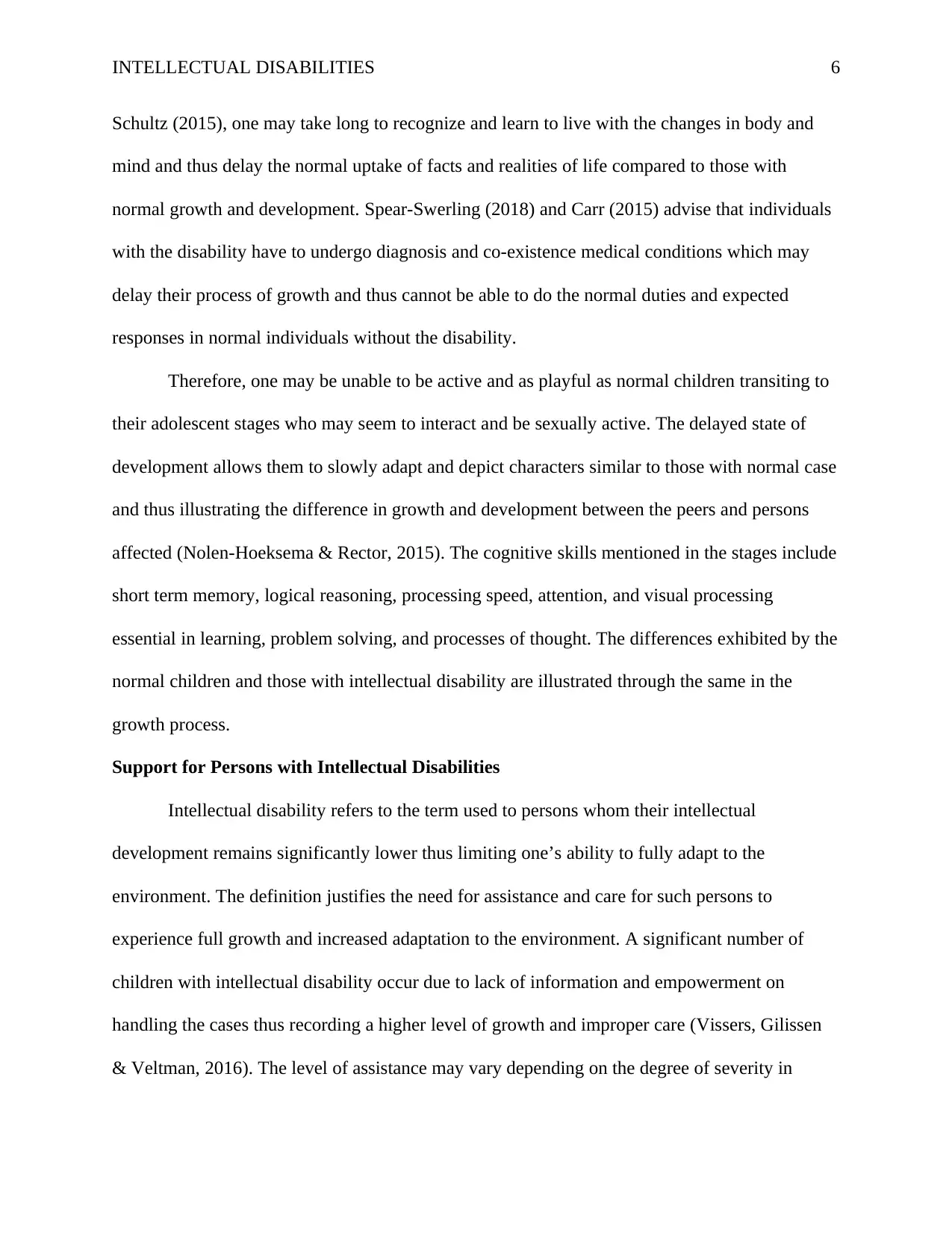
INTELLECTUAL DISABILITIES 6
Schultz (2015), one may take long to recognize and learn to live with the changes in body and
mind and thus delay the normal uptake of facts and realities of life compared to those with
normal growth and development. Spear-Swerling (2018) and Carr (2015) advise that individuals
with the disability have to undergo diagnosis and co-existence medical conditions which may
delay their process of growth and thus cannot be able to do the normal duties and expected
responses in normal individuals without the disability.
Therefore, one may be unable to be active and as playful as normal children transiting to
their adolescent stages who may seem to interact and be sexually active. The delayed state of
development allows them to slowly adapt and depict characters similar to those with normal case
and thus illustrating the difference in growth and development between the peers and persons
affected (Nolen-Hoeksema & Rector, 2015). The cognitive skills mentioned in the stages include
short term memory, logical reasoning, processing speed, attention, and visual processing
essential in learning, problem solving, and processes of thought. The differences exhibited by the
normal children and those with intellectual disability are illustrated through the same in the
growth process.
Support for Persons with Intellectual Disabilities
Intellectual disability refers to the term used to persons whom their intellectual
development remains significantly lower thus limiting one’s ability to fully adapt to the
environment. The definition justifies the need for assistance and care for such persons to
experience full growth and increased adaptation to the environment. A significant number of
children with intellectual disability occur due to lack of information and empowerment on
handling the cases thus recording a higher level of growth and improper care (Vissers, Gilissen
& Veltman, 2016). The level of assistance may vary depending on the degree of severity in
Schultz (2015), one may take long to recognize and learn to live with the changes in body and
mind and thus delay the normal uptake of facts and realities of life compared to those with
normal growth and development. Spear-Swerling (2018) and Carr (2015) advise that individuals
with the disability have to undergo diagnosis and co-existence medical conditions which may
delay their process of growth and thus cannot be able to do the normal duties and expected
responses in normal individuals without the disability.
Therefore, one may be unable to be active and as playful as normal children transiting to
their adolescent stages who may seem to interact and be sexually active. The delayed state of
development allows them to slowly adapt and depict characters similar to those with normal case
and thus illustrating the difference in growth and development between the peers and persons
affected (Nolen-Hoeksema & Rector, 2015). The cognitive skills mentioned in the stages include
short term memory, logical reasoning, processing speed, attention, and visual processing
essential in learning, problem solving, and processes of thought. The differences exhibited by the
normal children and those with intellectual disability are illustrated through the same in the
growth process.
Support for Persons with Intellectual Disabilities
Intellectual disability refers to the term used to persons whom their intellectual
development remains significantly lower thus limiting one’s ability to fully adapt to the
environment. The definition justifies the need for assistance and care for such persons to
experience full growth and increased adaptation to the environment. A significant number of
children with intellectual disability occur due to lack of information and empowerment on
handling the cases thus recording a higher level of growth and improper care (Vissers, Gilissen
& Veltman, 2016). The level of assistance may vary depending on the degree of severity in
⊘ This is a preview!⊘
Do you want full access?
Subscribe today to unlock all pages.

Trusted by 1+ million students worldwide
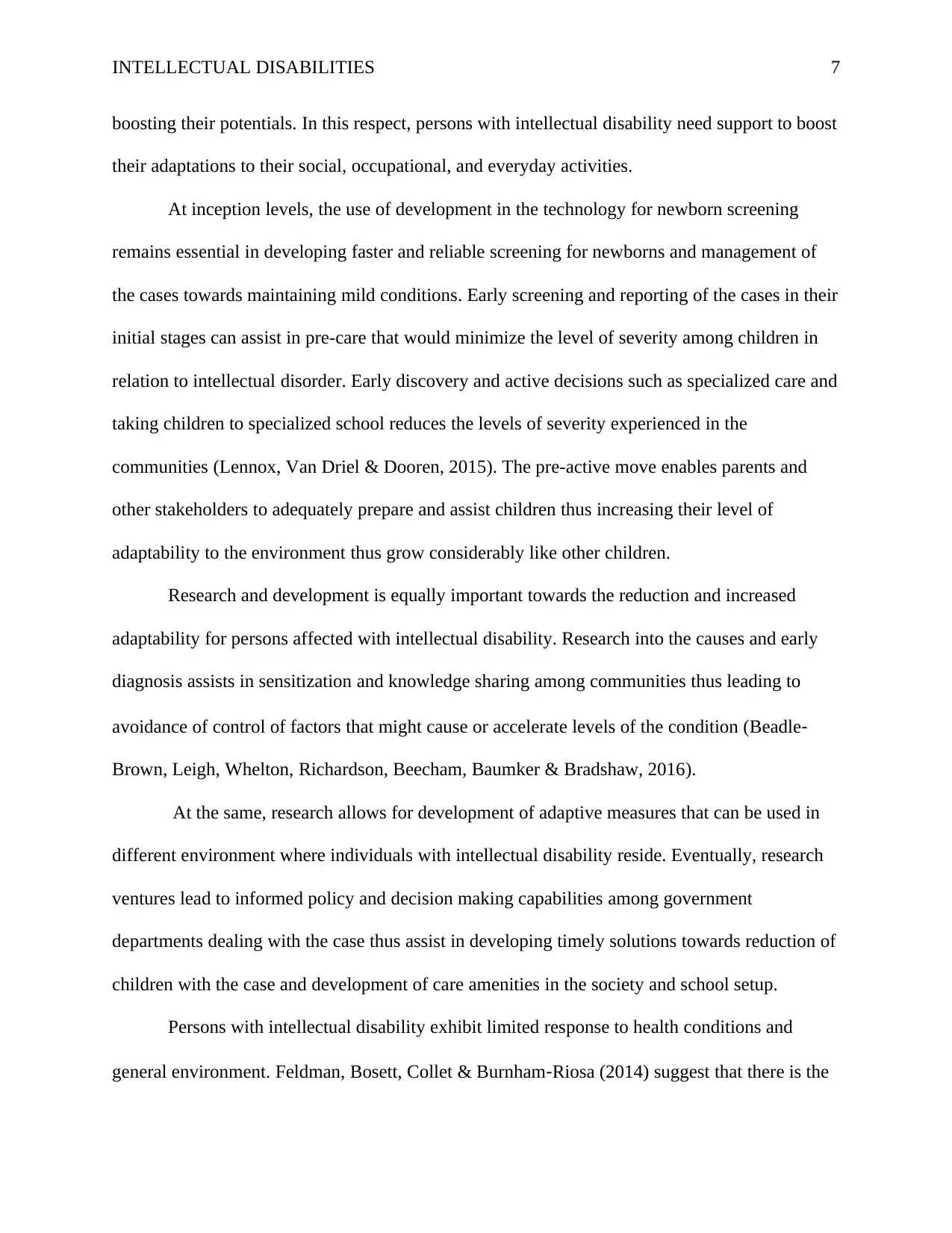
INTELLECTUAL DISABILITIES 7
boosting their potentials. In this respect, persons with intellectual disability need support to boost
their adaptations to their social, occupational, and everyday activities.
At inception levels, the use of development in the technology for newborn screening
remains essential in developing faster and reliable screening for newborns and management of
the cases towards maintaining mild conditions. Early screening and reporting of the cases in their
initial stages can assist in pre-care that would minimize the level of severity among children in
relation to intellectual disorder. Early discovery and active decisions such as specialized care and
taking children to specialized school reduces the levels of severity experienced in the
communities (Lennox, Van Driel & Dooren, 2015). The pre-active move enables parents and
other stakeholders to adequately prepare and assist children thus increasing their level of
adaptability to the environment thus grow considerably like other children.
Research and development is equally important towards the reduction and increased
adaptability for persons affected with intellectual disability. Research into the causes and early
diagnosis assists in sensitization and knowledge sharing among communities thus leading to
avoidance of control of factors that might cause or accelerate levels of the condition (Beadle‐
Brown, Leigh, Whelton, Richardson, Beecham, Baumker & Bradshaw, 2016).
At the same, research allows for development of adaptive measures that can be used in
different environment where individuals with intellectual disability reside. Eventually, research
ventures lead to informed policy and decision making capabilities among government
departments dealing with the case thus assist in developing timely solutions towards reduction of
children with the case and development of care amenities in the society and school setup.
Persons with intellectual disability exhibit limited response to health conditions and
general environment. Feldman, Bosett, Collet & Burnham‐Riosa (2014) suggest that there is the
boosting their potentials. In this respect, persons with intellectual disability need support to boost
their adaptations to their social, occupational, and everyday activities.
At inception levels, the use of development in the technology for newborn screening
remains essential in developing faster and reliable screening for newborns and management of
the cases towards maintaining mild conditions. Early screening and reporting of the cases in their
initial stages can assist in pre-care that would minimize the level of severity among children in
relation to intellectual disorder. Early discovery and active decisions such as specialized care and
taking children to specialized school reduces the levels of severity experienced in the
communities (Lennox, Van Driel & Dooren, 2015). The pre-active move enables parents and
other stakeholders to adequately prepare and assist children thus increasing their level of
adaptability to the environment thus grow considerably like other children.
Research and development is equally important towards the reduction and increased
adaptability for persons affected with intellectual disability. Research into the causes and early
diagnosis assists in sensitization and knowledge sharing among communities thus leading to
avoidance of control of factors that might cause or accelerate levels of the condition (Beadle‐
Brown, Leigh, Whelton, Richardson, Beecham, Baumker & Bradshaw, 2016).
At the same, research allows for development of adaptive measures that can be used in
different environment where individuals with intellectual disability reside. Eventually, research
ventures lead to informed policy and decision making capabilities among government
departments dealing with the case thus assist in developing timely solutions towards reduction of
children with the case and development of care amenities in the society and school setup.
Persons with intellectual disability exhibit limited response to health conditions and
general environment. Feldman, Bosett, Collet & Burnham‐Riosa (2014) suggest that there is the
Paraphrase This Document
Need a fresh take? Get an instant paraphrase of this document with our AI Paraphraser
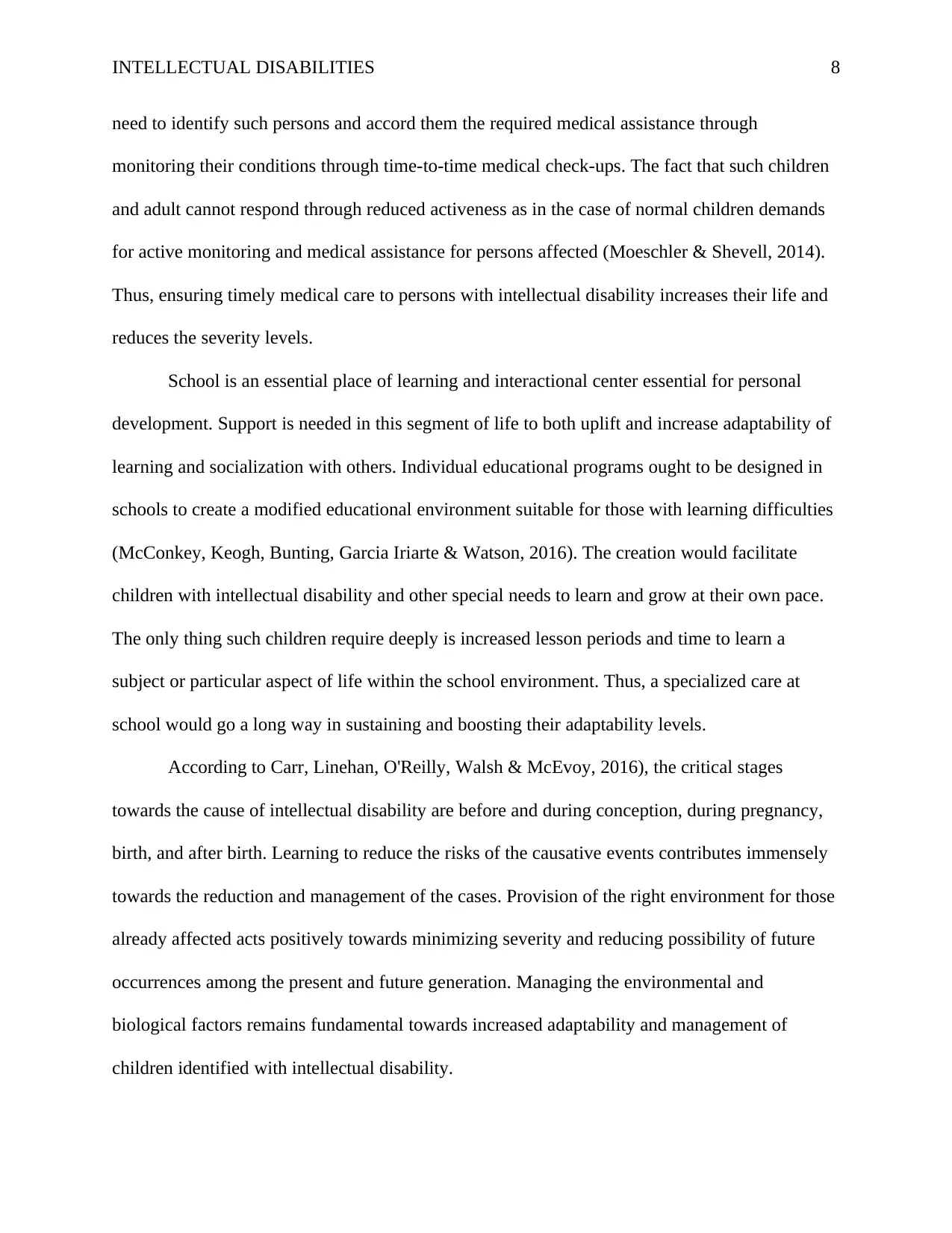
INTELLECTUAL DISABILITIES 8
need to identify such persons and accord them the required medical assistance through
monitoring their conditions through time-to-time medical check-ups. The fact that such children
and adult cannot respond through reduced activeness as in the case of normal children demands
for active monitoring and medical assistance for persons affected (Moeschler & Shevell, 2014).
Thus, ensuring timely medical care to persons with intellectual disability increases their life and
reduces the severity levels.
School is an essential place of learning and interactional center essential for personal
development. Support is needed in this segment of life to both uplift and increase adaptability of
learning and socialization with others. Individual educational programs ought to be designed in
schools to create a modified educational environment suitable for those with learning difficulties
(McConkey, Keogh, Bunting, Garcia Iriarte & Watson, 2016). The creation would facilitate
children with intellectual disability and other special needs to learn and grow at their own pace.
The only thing such children require deeply is increased lesson periods and time to learn a
subject or particular aspect of life within the school environment. Thus, a specialized care at
school would go a long way in sustaining and boosting their adaptability levels.
According to Carr, Linehan, O'Reilly, Walsh & McEvoy, 2016), the critical stages
towards the cause of intellectual disability are before and during conception, during pregnancy,
birth, and after birth. Learning to reduce the risks of the causative events contributes immensely
towards the reduction and management of the cases. Provision of the right environment for those
already affected acts positively towards minimizing severity and reducing possibility of future
occurrences among the present and future generation. Managing the environmental and
biological factors remains fundamental towards increased adaptability and management of
children identified with intellectual disability.
need to identify such persons and accord them the required medical assistance through
monitoring their conditions through time-to-time medical check-ups. The fact that such children
and adult cannot respond through reduced activeness as in the case of normal children demands
for active monitoring and medical assistance for persons affected (Moeschler & Shevell, 2014).
Thus, ensuring timely medical care to persons with intellectual disability increases their life and
reduces the severity levels.
School is an essential place of learning and interactional center essential for personal
development. Support is needed in this segment of life to both uplift and increase adaptability of
learning and socialization with others. Individual educational programs ought to be designed in
schools to create a modified educational environment suitable for those with learning difficulties
(McConkey, Keogh, Bunting, Garcia Iriarte & Watson, 2016). The creation would facilitate
children with intellectual disability and other special needs to learn and grow at their own pace.
The only thing such children require deeply is increased lesson periods and time to learn a
subject or particular aspect of life within the school environment. Thus, a specialized care at
school would go a long way in sustaining and boosting their adaptability levels.
According to Carr, Linehan, O'Reilly, Walsh & McEvoy, 2016), the critical stages
towards the cause of intellectual disability are before and during conception, during pregnancy,
birth, and after birth. Learning to reduce the risks of the causative events contributes immensely
towards the reduction and management of the cases. Provision of the right environment for those
already affected acts positively towards minimizing severity and reducing possibility of future
occurrences among the present and future generation. Managing the environmental and
biological factors remains fundamental towards increased adaptability and management of
children identified with intellectual disability.
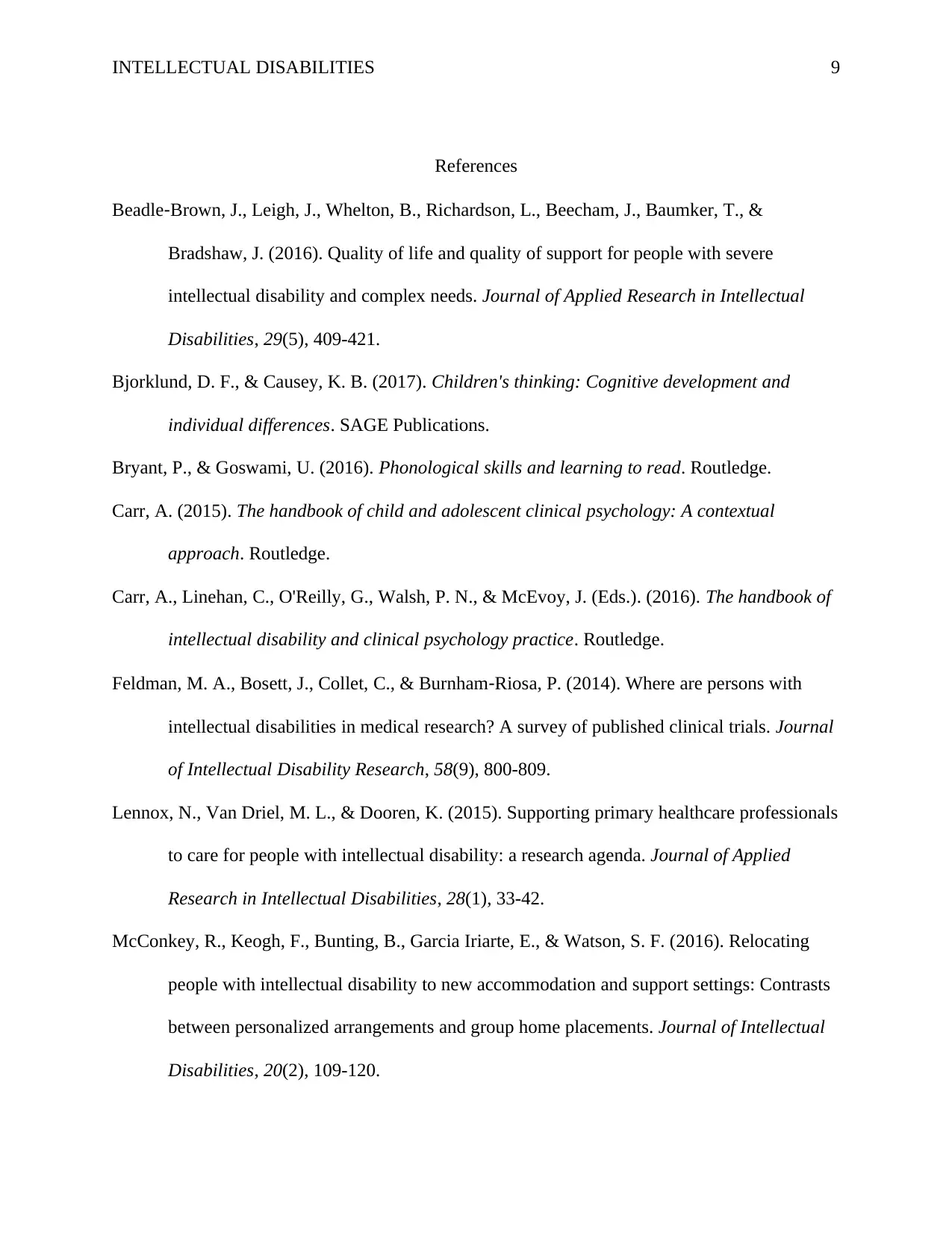
INTELLECTUAL DISABILITIES 9
References
Beadle‐Brown, J., Leigh, J., Whelton, B., Richardson, L., Beecham, J., Baumker, T., &
Bradshaw, J. (2016). Quality of life and quality of support for people with severe
intellectual disability and complex needs. Journal of Applied Research in Intellectual
Disabilities, 29(5), 409-421.
Bjorklund, D. F., & Causey, K. B. (2017). Children's thinking: Cognitive development and
individual differences. SAGE Publications.
Bryant, P., & Goswami, U. (2016). Phonological skills and learning to read. Routledge.
Carr, A. (2015). The handbook of child and adolescent clinical psychology: A contextual
approach. Routledge.
Carr, A., Linehan, C., O'Reilly, G., Walsh, P. N., & McEvoy, J. (Eds.). (2016). The handbook of
intellectual disability and clinical psychology practice. Routledge.
Feldman, M. A., Bosett, J., Collet, C., & Burnham‐Riosa, P. (2014). Where are persons with
intellectual disabilities in medical research? A survey of published clinical trials. Journal
of Intellectual Disability Research, 58(9), 800-809.
Lennox, N., Van Driel, M. L., & Dooren, K. (2015). Supporting primary healthcare professionals
to care for people with intellectual disability: a research agenda. Journal of Applied
Research in Intellectual Disabilities, 28(1), 33-42.
McConkey, R., Keogh, F., Bunting, B., Garcia Iriarte, E., & Watson, S. F. (2016). Relocating
people with intellectual disability to new accommodation and support settings: Contrasts
between personalized arrangements and group home placements. Journal of Intellectual
Disabilities, 20(2), 109-120.
References
Beadle‐Brown, J., Leigh, J., Whelton, B., Richardson, L., Beecham, J., Baumker, T., &
Bradshaw, J. (2016). Quality of life and quality of support for people with severe
intellectual disability and complex needs. Journal of Applied Research in Intellectual
Disabilities, 29(5), 409-421.
Bjorklund, D. F., & Causey, K. B. (2017). Children's thinking: Cognitive development and
individual differences. SAGE Publications.
Bryant, P., & Goswami, U. (2016). Phonological skills and learning to read. Routledge.
Carr, A. (2015). The handbook of child and adolescent clinical psychology: A contextual
approach. Routledge.
Carr, A., Linehan, C., O'Reilly, G., Walsh, P. N., & McEvoy, J. (Eds.). (2016). The handbook of
intellectual disability and clinical psychology practice. Routledge.
Feldman, M. A., Bosett, J., Collet, C., & Burnham‐Riosa, P. (2014). Where are persons with
intellectual disabilities in medical research? A survey of published clinical trials. Journal
of Intellectual Disability Research, 58(9), 800-809.
Lennox, N., Van Driel, M. L., & Dooren, K. (2015). Supporting primary healthcare professionals
to care for people with intellectual disability: a research agenda. Journal of Applied
Research in Intellectual Disabilities, 28(1), 33-42.
McConkey, R., Keogh, F., Bunting, B., Garcia Iriarte, E., & Watson, S. F. (2016). Relocating
people with intellectual disability to new accommodation and support settings: Contrasts
between personalized arrangements and group home placements. Journal of Intellectual
Disabilities, 20(2), 109-120.
⊘ This is a preview!⊘
Do you want full access?
Subscribe today to unlock all pages.

Trusted by 1+ million students worldwide
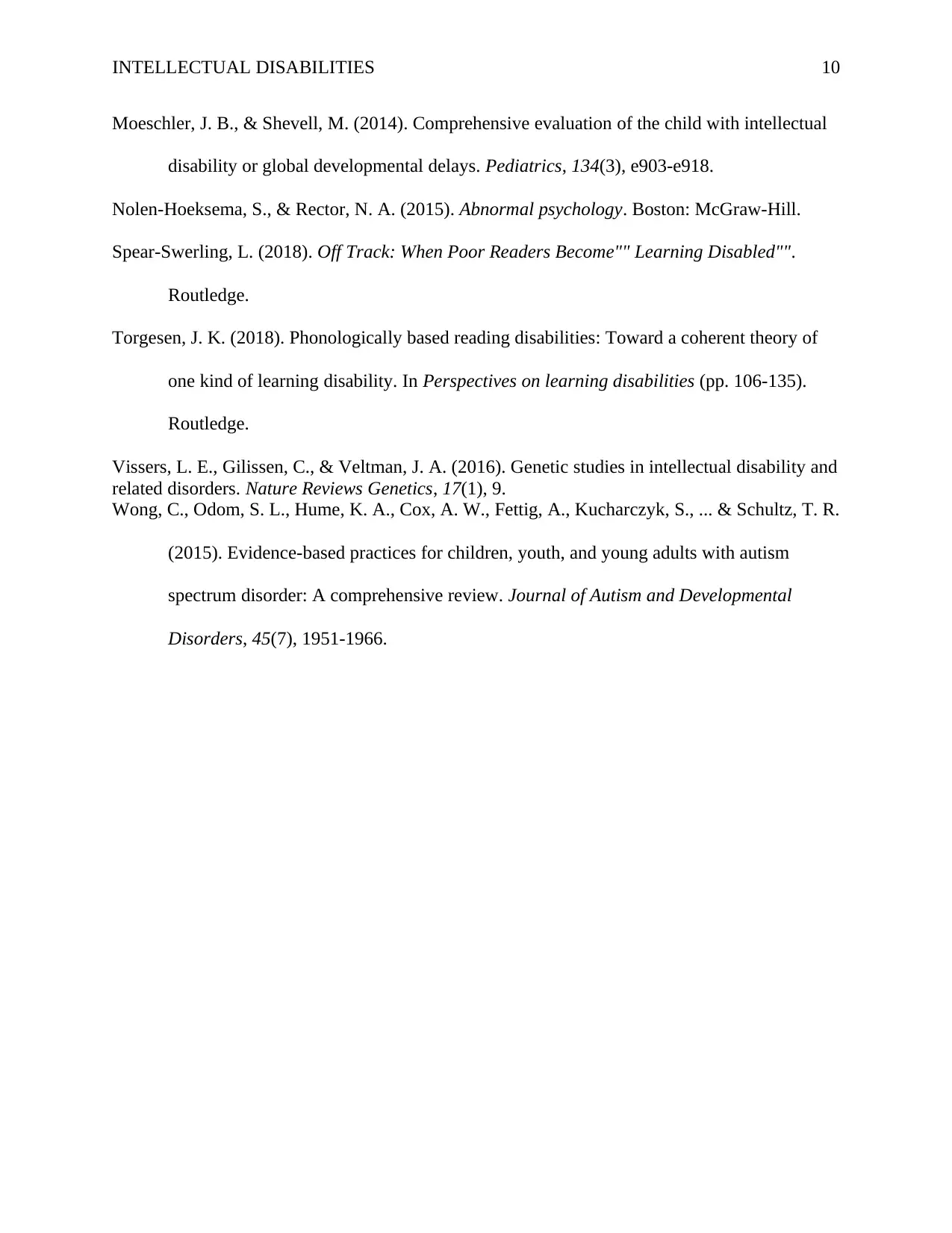
INTELLECTUAL DISABILITIES 10
Moeschler, J. B., & Shevell, M. (2014). Comprehensive evaluation of the child with intellectual
disability or global developmental delays. Pediatrics, 134(3), e903-e918.
Nolen-Hoeksema, S., & Rector, N. A. (2015). Abnormal psychology. Boston: McGraw-Hill.
Spear-Swerling, L. (2018). Off Track: When Poor Readers Become"" Learning Disabled"".
Routledge.
Torgesen, J. K. (2018). Phonologically based reading disabilities: Toward a coherent theory of
one kind of learning disability. In Perspectives on learning disabilities (pp. 106-135).
Routledge.
Vissers, L. E., Gilissen, C., & Veltman, J. A. (2016). Genetic studies in intellectual disability and
related disorders. Nature Reviews Genetics, 17(1), 9.
Wong, C., Odom, S. L., Hume, K. A., Cox, A. W., Fettig, A., Kucharczyk, S., ... & Schultz, T. R.
(2015). Evidence-based practices for children, youth, and young adults with autism
spectrum disorder: A comprehensive review. Journal of Autism and Developmental
Disorders, 45(7), 1951-1966.
Moeschler, J. B., & Shevell, M. (2014). Comprehensive evaluation of the child with intellectual
disability or global developmental delays. Pediatrics, 134(3), e903-e918.
Nolen-Hoeksema, S., & Rector, N. A. (2015). Abnormal psychology. Boston: McGraw-Hill.
Spear-Swerling, L. (2018). Off Track: When Poor Readers Become"" Learning Disabled"".
Routledge.
Torgesen, J. K. (2018). Phonologically based reading disabilities: Toward a coherent theory of
one kind of learning disability. In Perspectives on learning disabilities (pp. 106-135).
Routledge.
Vissers, L. E., Gilissen, C., & Veltman, J. A. (2016). Genetic studies in intellectual disability and
related disorders. Nature Reviews Genetics, 17(1), 9.
Wong, C., Odom, S. L., Hume, K. A., Cox, A. W., Fettig, A., Kucharczyk, S., ... & Schultz, T. R.
(2015). Evidence-based practices for children, youth, and young adults with autism
spectrum disorder: A comprehensive review. Journal of Autism and Developmental
Disorders, 45(7), 1951-1966.
1 out of 10
Related Documents
Your All-in-One AI-Powered Toolkit for Academic Success.
+13062052269
info@desklib.com
Available 24*7 on WhatsApp / Email
![[object Object]](/_next/static/media/star-bottom.7253800d.svg)
Unlock your academic potential
Copyright © 2020–2026 A2Z Services. All Rights Reserved. Developed and managed by ZUCOL.





